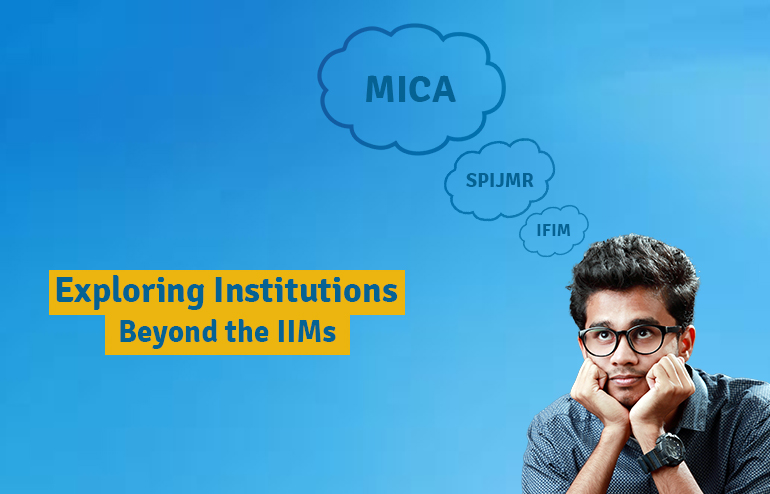In India, the observable trend tells us how management studies have a tradition of rigorous training, especially by test-prep centres to attain a coveted high rank in the CAT examinations. The selection process at the top IIMs have pressurised aspirants to work on specific requirements in an intensely competitive environment. There is an immense burden on the aspirants to enhance and design their CVs to accommodate particular requirements like high CAT percentiles, certain years of industry experience plus co-curricular activities.
For instance, everything else being equal, a bright engineering graduate with the reasonable job experience may not get a seat at the desired institute as some of the premier institutes often provide additional points based on gender and/or the academic stream to achieve diversity in classrooms. At the same time, another equally bright student will not be able to secure her candidature because of comparatively lower CAT rank despite having scored consistently throughout her academic life. So, what can be done to maintain parity between the intricate short-listing criteria among premier IIMs and their evaluation of capabilities in aspirants?
The other available fulltime programs at top IIMs are the PGPX programs which are expensive and require minimum work experience of five years. Some premier institutes are coming up with rigorous internal screening processes wherein they are providing leverages to aspirants based on their innovative and creative thinking, critical and analytical bent of mind, values they exhibit and see if they fit with the institute’s mission. Based on my personal experience, there are a few leading institutions in the country who are doing excellent work on this very front.
MICA Ahmedabad, SPIJMR Mumbai and IFIM Bangalore are the top examples to be cited who have already begun to set an example in the field of management studies. These institutions have proved to be pioneers when it comes to changing not only the way MBA is understood and defined pan-India but also how the admission protocols must be designed. First, none of these institutions gives a high weightage to CAT, XAT and GMAT scores compared to their IIM peers. Although one must appear for a national level entrance exam, one need not necessarily have a high score. MICA, for example, offers a
PGDM-C programme for students desiring to pursue management careers with a special emphasis on marketing and communications. The mission and vision of the programme are to groom ethical, well-rounded, responsible and talented professionals, who would manage and lead organizations using
analytical, innovative, creative and out-of-the-box approaches.To fulfil these criteria, the institute has its very own entrance exam dubbed as MICAT which aims to shortlist candidates who demonstrate an aptitude for expressing, assessing, and /or conceiving ideas that move people to action and achieve business results. Thus, MICA aims to train leaders in the fields of creativity, design, media and marketing communication areas.
SPIJIMR, on the other hand, has designed a selection process that assesses not only the intellectual readiness in terms of academics but also emotional readiness, work experience, extra-curricular activities and aptitude for and befitting the institute’s mission of value-based leadership. What sets SPIJMR apart is their focus on the ‘values’ and thus the key recruiters invited at their campus are the likes of Tata Administrative Services (TAS).
The IFIM curriculum focuses on grooming socially sensitive professionals who can provide innovation-led solutions for new age organisations. With a revised admission process which zeroes in on the innovative and critical thinking capacities of candidates along with their solution orientation, IFIM wishes
to create a diverse group of students who will be ready for the dynamically changing world of tomorrow. IFIM offers the bespoke curriculum which allows students to create their own learning paths and career goals. Each student is offered the flexibility to choose courses that paves the pathway for them to custom-create their own curriculum making each pupil’s journey and tale unique to their own individualised skillset.
IFIM forms the perfect breeding ground for those looking at new age roles in companies that are thinking of beyond tomorrow issues. With respect to IFIM, the biggest differentiator is the two unique tracks it offers: The first being the two-year program with a ‘Global Super Specialisation Track’ that makes you a ‘specialist for tomorrow’ ready to be a business professional in the ‘new era’. IFIM aims to do this by partnering with international universities having a global reputation. For example with one of its potential partners McCombs School of Business at the University of Texas, Austin, IFIM aims to shape leaders in Big Data and Block chain, while with Darden School of Business at University of Virginia, the institute envisions creating experts in Digital Business and Consumer Insights, and for candidates seeking career opportunities in Fintech, IFIM aims to collaborate with Johnson College of Business at Cornell University.
Very few current institutions are offering such opportunities. One of the innovations being initiated by IFIM is an engagement driven final placement process which aims to replace the conventional interview and/or Group Discussion format. The cohort that will go for the ‘Global Super-specialization Track’ will be a combination of executives from recruiting partner companies and second-year participants, allowing them to work in groups in finding solutions to real issues being faced by the industry in real time. Hence, IFIM’s objective is to create a differentiated and engagement driven approach towards
Placements which have not been explored by conventional institutions. The second track is essentially for those looking for international careers in developed countries. The IFIM PGDM-IB program is designed in a manner that allows students to complete one year in India, and then go abroad to the partner institutions in the USA or Europe and complete the program there with the advantage of having access to their career services.
As illustrated above, the answer to the question, ‘What if I am not a CAT topper?’ lies in aspirants exploring institutions which are aligned to their strengths and career aspirations, which need not necessarily be an IIM.
I have spoken here of only three institutions with which I have been associated. However, I am certain if a diligent candidate were to look carefully and explore, he/she might come across some more such institutions. As I see it, the real challenge is not about being a CAT topper but to come out of the herd mentality of looking at only a limited number of institutions, where high CAT score is a prerequisite. Each individual is different and needs to have his/her own unique plan of action based on
One’s specific strengths and skills.
So whilst CAT toppers may have a whole bunch of reasons to celebrate their score, the ones that do not have need not fret, for when one door closes, another window of great opportunity swing open elsewhere.
Dr Atish Chattopadhyay
Director, IFIM Business School










